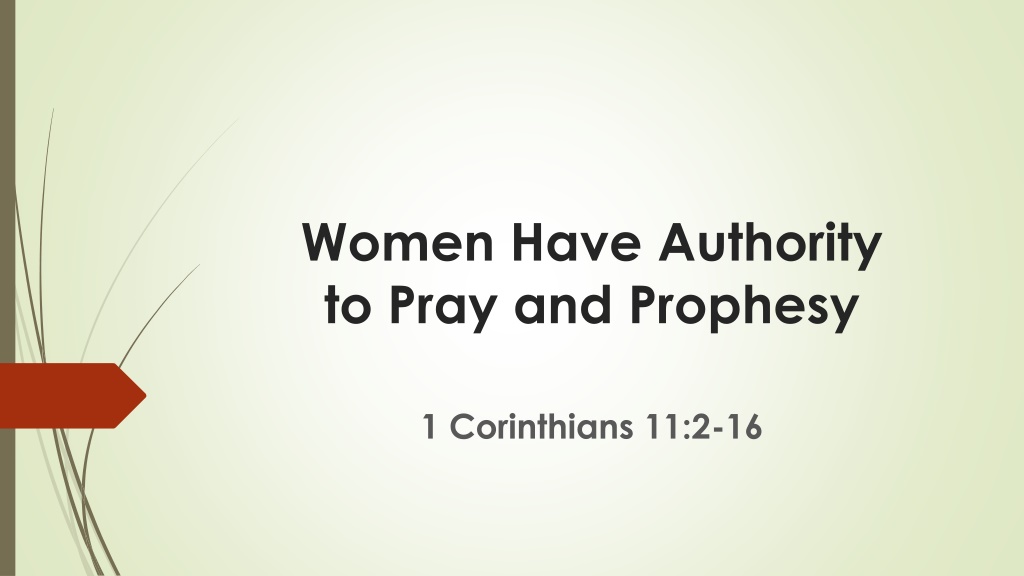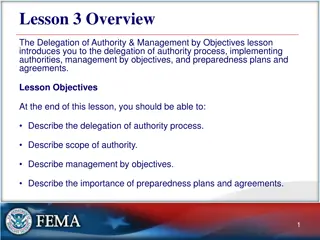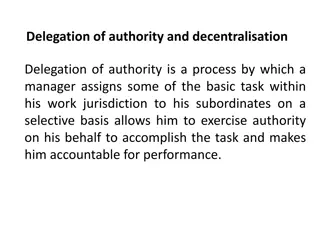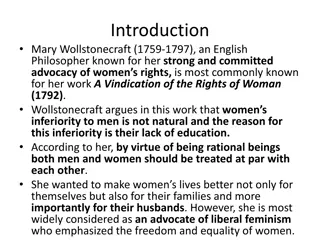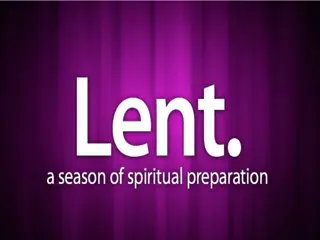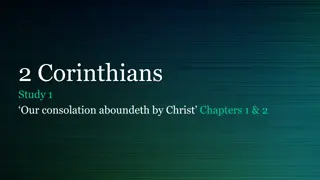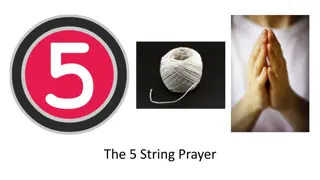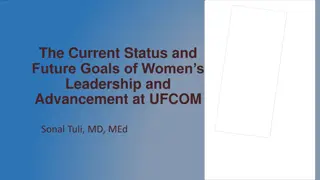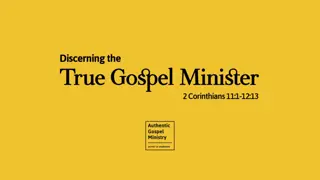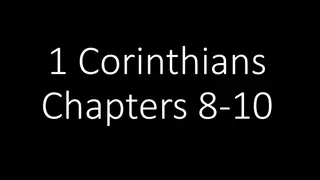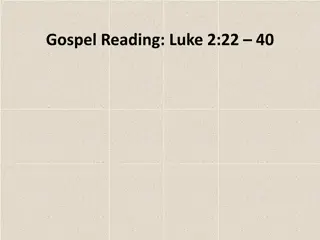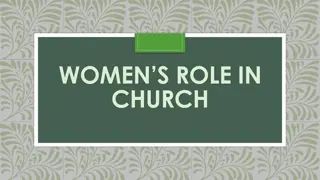Women's Authority to Pray and Prophesy in 1 Corinthians 11:2-16
Women in the church of Christ at Corinth were encouraged to pray and prophesy, highlighting their active role in sharing the word of God. The passage addresses the significance of head-covering during worship, indicating respect for male authority and the cultural norms of that time. Paul's instructions aimed to promote order and reverence in worship gatherings, addressing specific issues faced by both men and women in the early Christian community.
Uploaded on Sep 27, 2024 | 0 Views
Download Presentation

Please find below an Image/Link to download the presentation.
The content on the website is provided AS IS for your information and personal use only. It may not be sold, licensed, or shared on other websites without obtaining consent from the author. Download presentation by click this link. If you encounter any issues during the download, it is possible that the publisher has removed the file from their server.
E N D
Presentation Transcript
Women Have Authority to Pray and Prophesy 1 Corinthians 11:2-16
C. R. Nichol (1876-1961), Gods Woman (1938) Conservative, non-institutional minister and author The thoughtful cannot fail to learn from the excerpt at the head of this chapter [1 Cor 11:4-5], that women were to pray and Prophesy [sic]. Paul is not presenting a hypothetical case. He says the women n the church of Christ at Corinth were to pray and prophesy. . . Since the purpose of prophesying was to edify, and women in the church [that is, the assembly where they shared the Lord s Supper] at Corinth did prophesy, it must follow that they not only spoke in word that could be heard, but words that were understood, else there would have been no edifying.
1 Corinthians 11:4-6 Any man [husband?] who prays or prophesies with something on his head disgraces his head, but any woman [wife?] who prays or prophesies with her head unveiled [uncovered] disgraces her head it is one and the same thing as having her head shaved. For if a woman will not veil [cover] herself, then she should cut off her hair; but if it is disgraceful for a woman to have her hair cut off or to be shaved, she should wear a veil.
Lots of Questions; Many Uncertainties What is the head-covering, and what does it mean or signify? What is the problem that occasioned this text? What is the occasion of the problem and its context? What does the word head mean in 11:3 as well as its other uses? Is the text about men and women in general or husbands/wives? How does headship relate to praying and prophesying? Who is praying and prophesying? What does praying and prophesying mean? Why does Paul appeal to Genesis 2? Authority or Relationship? How do verses 11-12 respond to or balance verses 7-9? What does because of the angels mean in 11:10? What is the significance of authority in 11:10?
What was the Problem in 1 Cor 11? Problem with Men? Were men praying and prophesying [leading worship] with covered heads, as was the Roman custom (the covering showed respect before the deity)? Paul corrects the men, not the women, and repurposes the meaning of the covering from piety to male authority. Problem with Women? Were women praying and prophesying [leading worship] with uncovered heads, which was neither Roman nor Greek custom except, perhaps, in some cults? Women must remained covered in order to honor male authority. Problem of Male Insistence that Women Lead Uncovered? While men led worship with uncovered heads, did some oppose women praying and prophesying with covered heads due for some reason? But women, both married and unmarried, both noble and lower class, led worship with propriety by covering their heads. Paul affirms this practice (what Paul calls a tradition). Problem of Women Prophesying Were some men forbidding women from prophesying? Paul affirms their prophesying as long as they are modestly covered.
What is at Issue? Ultimately, we are so distant from the situation, it is difficult to precisely identify the nature of the problem and its issues. Yet, it seems Paul is regulating head-covering practices for Corinth, and in doing so, he distinguishes the head-coverings practices of men and women as leaders in the assembly. Why should women be covered but men not? What is the meaning of the covering? Male authority rooted in a created hierarchy? Sexual propriety or modesty within a culture? Perhaps Paul applies the covering to all women for the sake of modesty. Consequently, it is fitting or proper for a woman to pray to God with a covered head (1 Corinthians 11:13). Whatever the situation and its rationale, that women pray and prophesy in this circumstance is assumed as a normal and regular practice.
What Is Praying and Prophesying? 1 Corinthians 11 Any man who prays or prophesies (v. 4). Prayer in 1 Corinthians 14 Interpreted tongue- speaking edifies the assembly (v. 5). Prophecy in 1 Corinthians 14 Those who prophesy speak to other people for their upbuilding and encouragement and consolation (v. 3). Those who prophesy build up the assembly (v. 4). Any woman who prays or prophesies (v. 5) Is it proper for a woman to pray to God with her head uncovered (v. 13)? If I pray in a tongue . . . (v. 14) I will pray with the spirit, but I will pray with the mind also (v. 15) All prophesy one by one so that all may learn and all be encouraged (v. 31).
Women Prophets in the Hebrew Bible Miriam (Exodus 15:20) Then the prophet Miriam, Aaron s sister, took a tambourine in her hand; and all the women went out after her with tambourines and with dancing. And Miriam sang to them [masculine]: Sing [masculine] to the LORD! Deborah (Judges 4:4) At that time Deborah, a prophet, wife of Lappidoth, was judging Israel. She used to sit under the palm of Deborah between Ramah and Bethel in the hill country of Ephraim; and the Israelites came up to her for judgment. Huldah (2 Kings 22:14-16) [Royal envoys and the high priest] went to the prophet Huldah the wife of Shallum . . . they consulted with her. She declared to them, Thus says the Lord, the God of Israel: Tell the man who sent you to me, Thus says the Lord. . .
Women Prophets in the New Testament Anna (Luke 2:36-38) There was also a prophet, Anna the daughter of Phaneul . . . She never left the temple but worshipped there with fasting and prayer night and day. At that moment she came, and began to praise God and speak about the child to all who were looking for the redemption of Jerusalem. Spirit Poured out on Women (Acts 2:17-18) I will pour out my Spirit upon all flesh, and your sons and daughters shall prophesy. . . Even upon my slaves, both men and women, in those days I will pour out my Spirit; and they shall prophesy. Philip s Daughters (Acts 21:9) He had four unmarried daughters who were prophets.
The Authority of Prophets Ephesians 4:11 The gifts [Christ] gave were that some would be apostles, some prophets, some evangelists, some pastors and teachers. 1 Corinthians 12:28 And God has appointed in the church [assembly] first apostles, second prophets, third teachers; then deeds of power, then gifts of healing, forms of assistance, forms of leadership, various kinds of tongues. The function of prophecy (1 Corinthians 14:3): upbuilding (or edification), encouragement (or exhortation), and consolation (or comfort). The sermon we know as Hebrews is a word of exhortation (13:22; cf. Acts 13:15) Paul instructs Timothy (1 Timothy 4:13): give attention to the public reading of Scripture, to exhorting, to teaching.
Important Take-Away In this text, Paul does not give men and women different roles or assign them different gifts. Both pray and prophesy Instead, Paul only identifies different dress (re: head- covering) relative to cultural perceptions of what the head-covering means according to Greco-Roman social conventions.
1 Corinthians 11:2, 16-17 1Cor. 11:2, 17 I commend you because you remember me in everything and maintain the traditions [of the assembly?] just as I handed them on to you. . . Now in the following instructions I do not commend you. 1Cor. 11:16 But if anyone is disposed to be contentious we have no such custom, nor do the churches [assemblies] of God.
Praying and Prophesying Where? Men and women are gathered together; otherwise, there is no need for the covering when only women are gathered. It is a public gathering since there is no need for the covering in the domestic setting. It is a gathering in which people are edified by praying and prophesying. Paul gave Corinth some traditions some of which they kept (v. 2) and some of them they did not (v. 17). These traditions are related to prayer, prophecy, and the Lord s Supper, which reflect communal gathering practices. These traditions happen in the assembly. What 1 Corinthians 11:2-16 describes have something to do with assemblies (churches) of God (11:16), and the Lord s Supper happens in an assembly (church) of God (11:22). Women, then, prayed and prophesied in the assemblies of the saints.
The Argument of 1 Corinthians 11:3-12 The Headship Principle (v. 3) Uncovered female prophet disgraces her head (4-6) A woman s head-covering honors relationship (7-9) And the head-covering is her own authority (10) Nevertheless, in the Lord . . . (v. 11) Neither man nor woman are independent of each other (v. 11). Woman came from man but men come through women (v. 12). But all things come from God.
1 Corinthians 11:3, 7-12 (NIV, 2011) 1Cor. 11:3 But I want you to realize that the head of every man is Christ, and the head of the woman is man, and the head of Christ is God. 1Cor. 11:7-12 A man ought not to cover his head, since he is the image and glory of God; but woman is the glory of man. For man did not come from woman, but woman from man; neither was man created for woman, but woman for man. It is for this reason that a woman ought to have authority over her own head, because of the angels. Nevertheless, in the Lord woman is not independent of man, nor is man independent of woman. For as woman came from man, so also man is born of woman. But everything comes from God.
What Shall We Say About Head Meaning of Head Authority? Some believe the woman covers her head as a symbol of her husband s (or male) authority; a sign of hierarchy. Source/Kinship? Some believe the man is the head in the sense that he [Adam] is the source of the woman s life, and this entails a deep connection/kinship between them. The point is relational rather than hierarchical. Prominence? Some believe the man has a sense of prominence as the first but this does not necessarily imply any authority or rank. Whatever the specific meaning, women may lead an assembly in prayer and prophesy without dishonoring their head! Headship, whatever it means, does not deny women the privilege of participation in the assembly through prayer and prophecy.
Authority in 1Corinthians 11:10 Translations NRSV: a woman ought to have a symbol of authority on her head, because of the angels. NIV (2011): a woman ought to have authority over her own head because of the angels. KJV: For this cause ought the women to have power on her head because of the angels. 1 Corinthians 11:10 literally says, to have authority (exousia is the Greek word for authority). Does Paul mean women ought to pray and prophesy with a covered head because: she needs a symbol of male authority on her head? Or, she has her own authority to act when covered? Or, she has the right to be covered for her own propriety/modesty?
To Have Authority (Greek Phrase) Elsewhere in 1 Corinthians Do we not have the right (exousia) to our food and drink (9:4). Do we not have the right (exousia) to be accompanied by a believing wife (9:4). Is it only Barnabas and I who have no right (exousia) to refrain from working for a living (9:5). having his own desire under control (exousia) (7:37). Note: Paul s use is always active in meaning it is the authority/right/control that one possesses. The only time Paul uses authority (exousia) in relation to men and women is in this statement in 1 Corinthians 7:4: For the wife does not have authority over her own body, but the husband does. Likewise the husband does not have authority over his own body, but the wife does. Thus, a mutual authority!
To Have Authority: The Greek Phrase Elsewhere The phrase is to have authority (exousia) upon [epi] Revelation 11:6 they have authority over the waters to turn them into blood. Revelation 14:18 the angel who has authority over fire Revelation 16:9 God, who had authority over these plagues Revelation 20:6 Over these the second death has no power (exousia) Conclusion: Paul is saying a woman has authority over her own head; it is not male authority. Rather, she has the right to cover herself as she pleases and participate in the praying and prophesying of the assembly.
In the Lord (1 Corinthians 11:11-12) The woman is sourced from man in order to complete humanity so that humanity might pursue its vocation (Genesis 1:26-28). Man, however, is now sourced from woman as men now come into the world through women. Paul is concerned that some might understand headship in a negative way, and consequently, writes, Nevertheless. Paul applies headship in the context of what it means to share life in the Lord. Men and women are not independent of each other but mutually enrich each others as both are sourced from God own s life.
Some Conclusions (1 Cor 11:2-16) Paul assumes women are praying and prophesying in the assembly where they edify, exhort, and comfort others in the assembly. This praying and prophesying is audible, public, visible, and edifying. Headship, whatever it means, does not deny women the privilege to pray and prophesy in the assembly. Women ought to honor their relationship to men (from whom they first received life), and at the same time men ought to honor their relationship to women (through whom they have life). This is a mutually enriching kinship. It is a mutual authority, which finds one expression in sexual relations (1 Corinthians 7:4). Moreover, women have the right (authority) to pray and prophesy in the assembly since they have authority over their own heads.
The Relationship of 1 Cor 11:2-16 to 1 Cor 14:34-35 Corinthian Assemblies Men and women, both Jew and Gentile as well as enslaved and free, gathered for communal praise and mutual encouragement. Women, as well as men, exercised their gifts in the assembly for the sake of the common good, including prayer and prophecy but also hymns, teachings, tongues, and the interpretation of tongues. Both men and women were instructed to exercise these gifts modestly, with propriety, and in an orderly manner.
Application: What I Take it to Support If my conclusions are accurate, then . . . the assembly is a place where both men and women may exercise their gifts for the edification of the assembled people of God, women may lead the assembly through prayer and prophecy (even preaching), and both men and women must do so in ways that honor the relationships they sustain with each other and God as well as participate in ways that pay attention to cultural perceptions (whatever the head-covering means).
C. R. Nichol (1876-1961), Gods Woman (1938) Conservative, non-institutional minister and author The thoughtful cannot fail to learn from the excerpt at the head of this chapter [1 Cor 11:4-5], that women were to pray and Prophesy [sic]. Paul is not presenting a hypothetical case. He says the women n the church of Christ at Corinth were to pray and prophesy. . . Since the purpose of prophesying was to edify, and women in the church [that is, the assembly where they shared the Lord s Supper] at Corinth did prophesy, it must follow that they not only spoke in word that could be heard, but words that were understood, else there would have been no edifying.
F. W. Smith, Gospel Advocate (15 Aug 1929): 779 I conclude, therefore, not dogmatically, but to be on the safe side, that since the word of God does not clearly and explicitly inform us that it would be Scriptural for a woman to lead the prayer in the assembly of the saints, it would be best to conform to the custom in tis respect of the loyal churches.
